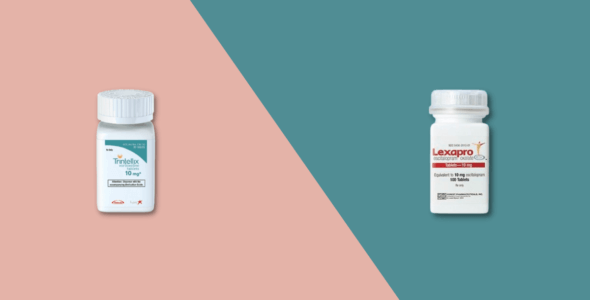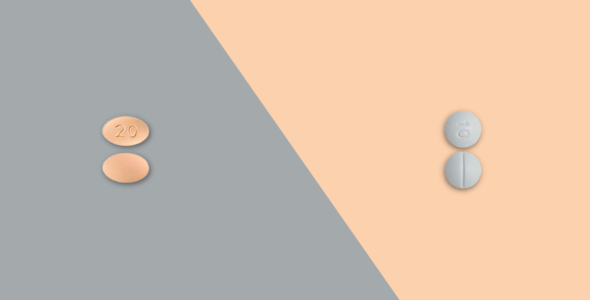Lexapro and Zoloft are brand names for prescription drugs used to treat depression and other mental health conditions. They work by increasing your body’s serotonin levels, a neurotransmitter that affects your mood, appetite, and sleep, among other things.
Here we will look at Lexapro vs Zoloft, explain how they work, their similarities and differences, their side effects, and more. This should provide you with the basics to better understand your options.
What is Lexapro?
Lexapro (escitalopram oxalate) is an FDA-approved (U.S. Food and Drug Administration) antidepressant medication manufactured by Forest Laboratories. Lexapro is a selective serotonin reuptake inhibitor (SSRI) used for:
- Acute and maintenance treatment of Major Depressive Disorder (MDD) in adults and adolescents aged 12-17 years
- Acute treatment of Generalized Anxiety Disorder (GAD) in adults
Lexapro is not recommended for use in pediatric patients less than 12 years of age, due to an increased risk of suicidal thoughts and behavior in children, adolescents, and young adults.
Lexapro dosage
Lexapro is available in tablet or oral solution form, in the following doses: 5 mg, 10 mg, 20 mg, and 1 mg per mL. As with Trintellix, when discontinuing Lexapro, withdrawal symptoms such as agitation may occur. Taper off the drug slowly and do not stop abruptly.
Always speak with a healthcare professional for medical advice about any changes to your dose so they can monitor and evaluate your condition.
What is Zoloft?
Zoloft (sertraline) is an FDA (U.S. Food and Drug Administration) approved medication manufactured by Pfizer Inc. It is also classed as a selective serotonin reuptake inhibitor (SSRI) used for the treatment of depression, including:
- Major depressive disorder (MDD)
- Obsessive-compulsive disorder (OCD)
- Panic disorder (PD)
- Post-traumatic stress disorder (PTSD)
- Social anxiety disorder (SAD)
- Premenstrual dysphoric disorder (PMDD)
Zoloft dosage
Zoloft is available in tablet form, in the following doses: 25 mg, 50 mg, and 100 mg, and as an oral solution, 20 mg/mL. Your recommended starting and maintenance dose will be based on the condition you are being treated for.
Common side effects of Lexapro and Zoloft
The most common side effects of Lexapro in clinical trials include:
- Sexual side effects such as sexual dysfunction (ejaculatory delay, decreased libido, inability to orgasm)
- Nausea
- Increased sweating
- Fatigue
- Sleepiness, drowsiness
- Painful urination
- Dizziness
- Anxiety
- Trouble sleeping (insomnia)
- Dry mouth, increased thirst, loss of appetite
- Constipation
- Nosebleed, heavy menstrual periods
More serious side effects of Lexapro include
- Weight gain
- Clinical worsening of suicide risk
- Serotonin syndrome especially when co-administered with other serotonergic agents (including triptans, tricyclic antidepressants, fentanyl, lithium, tramadol, tryptophan, buspirone, amphetamines, and St. John’s Wort)
- Seizures
- Activation of mania/hypomania
- Hyponatremia
- Life-threatening bleeding
- Interference with cognitive and motor performance
- Angle-closure glaucoma
The most common side effects of Zoloft in clinical trials compared to placebo include:
- Indigestion
- Nausea
- Diarrhea
- Loss of appetite
- Increased sweating
- Tremors
- Sexual side effects such as sexual dysfunction – (ejaculation failure, and decreased sex drive)
More serious side effects of Zoloft include
- Serotonin syndrome
- Increased risk of bleeding
- Activation of mania/hypomania
- Angle-closure glaucoma
- Changes in vision, eye pain, redness, or swelling
- Seizures
- Low blood sodium
These aren’t all the side effects Lexapro or Zoloft can cause. You can find more details in the patient leaflet that comes with your medication. If you have any concerns about adverse effects, talk to your physician or pharmacist.
Lexapro and Zoloft drug interactions
Lexapro can interact with other medications. These include:
- Antiplatelet drugs such as clopidogrel
- NSAIDs (nonsteroidal anti-inflammatory drugs) such as ibuprofen, naproxen
- Blood thinners such as warfarin
- Monoamine Oxidase Inhibitors (MAOIs) – isocarboxazid, linezolid, metaxalone, methylene blue, moclobemide, phenelzine, procarbazine, selegiline, tranylcypromine
- St. John’s wort
- Other SSRIs such as fluoxetine, paroxetine, sertraline
- SNRIs such as duloxetine, venlafaxine
- Alcohol
- Lithium
- Pimozide and Celexa
Zoloft can interact with other medications. These include:
Lexapro and Zoloft can interact with other medications. This can change how Lexapro and Zoloft and other medications work and can make side effects more likely. Tell your prescribing physician about all your drugs, including vitamins and dietary supplements.
Lexapro and Zoloft contraindications
You should not use Lexapro if you:
- Are allergic to the active ingredient escitalopram, or citalopram
- Have had an allergic reaction to any of the other ingredients in Lexapro
- Are pregnant or are planning to become pregnant
Talk to your doctor before using Lexapro if you:
- Are taking any of the medications that could interact with Lexapro
- Have liver or kidney disease
- Suffer from seizures
- Have low blood sodium levels
- Have heart disease or high blood pressure
- Have had a stroke
- Have bleeding problems
- Have sexual problems
- Have bipolar disorder
- Have suicidal thoughts
- Have a drug addiction
- Are breastfeeding or are planning to breastfeed – This medication passes into breast milk
You should not use Zoloft if you:
- Are allergic to the active ingredient sertraline
- Are allergic to any of the other ingredients in Zoloft
- Are taking pimozide
- Have stopped taking monoamine oxidase inhibitors (MAOIs) within 14 days
Talk to your doctor before using Zoloft if you:
- Are taking any of the medications that could interact with Zoloft
- Have bipolar disorder
- Have heart disease, high blood pressure, or have had a stroke
- Have liver or kidney disease
- Suffer from seizures
- Have sexual problems
- Have glaucoma
- Have bleeding problems
- Have long QT syndrome
- Have low sodium levels in your blood
- Are pregnant or are planning to become pregnant
- Are breastfeeding or are planning to breastfeed
Other drugs for mental health disorders
- Wellbutrin (bupropion)
- Cymbalta (duloxetine)
- Prozac (fluoxetine)
- Paxil (paroxetine)
- Celexa (citalopram)
If you have any concerns about Lexapro or Zoloft side effects, talk to your physician, or pharmacist for medical advice. Also inform your healthcare provider about any medical conditions, supplements, and over-the-counter meds you are taking. You are also encouraged to report side effects to the FDA: visit http://www.fda.gov/medwatch or call 1-800-FDA-1088.


